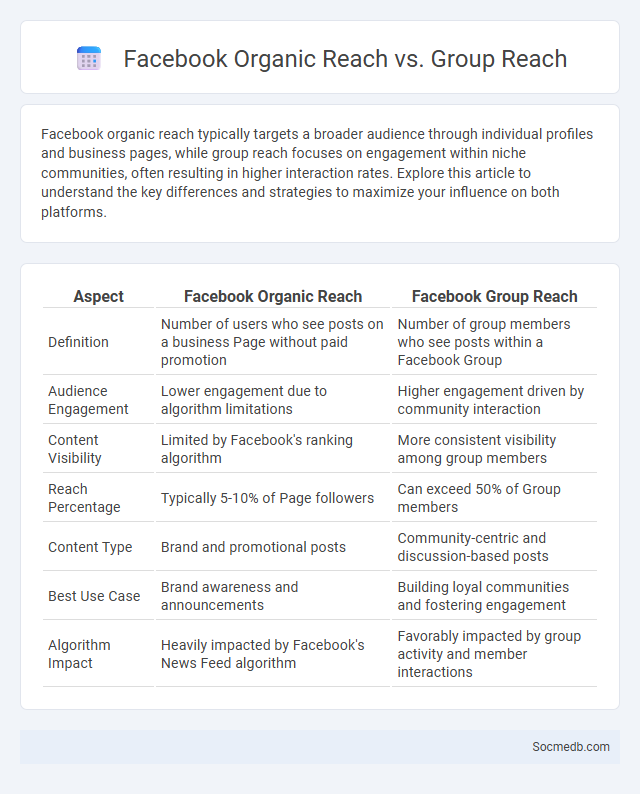
Photo illustration: Facebook Organic Reach vs Group Reach
Facebook organic reach typically targets a broader audience through individual profiles and business pages, while group reach focuses on engagement within niche communities, often resulting in higher interaction rates. Explore this article to understand the key differences and strategies to maximize your influence on both platforms.
Table of Comparison
| Aspect | Facebook Organic Reach | Facebook Group Reach |
|---|---|---|
| Definition | Number of users who see posts on a business Page without paid promotion | Number of group members who see posts within a Facebook Group |
| Audience Engagement | Lower engagement due to algorithm limitations | Higher engagement driven by community interaction |
| Content Visibility | Limited by Facebook's ranking algorithm | More consistent visibility among group members |
| Reach Percentage | Typically 5-10% of Page followers | Can exceed 50% of Group members |
| Content Type | Brand and promotional posts | Community-centric and discussion-based posts |
| Best Use Case | Brand awareness and announcements | Building loyal communities and fostering engagement |
| Algorithm Impact | Heavily impacted by Facebook's News Feed algorithm | Favorably impacted by group activity and member interactions |
Understanding Facebook Organic Reach
Facebook organic reach refers to the number of unique users who see your content without paid promotion, highlighting the importance of engagement and relevance in your posts. Algorithms prioritize content that sparks meaningful interactions and aligns with users' interests, making consistency and quality crucial for maximizing visibility. By optimizing your content strategy to foster genuine engagement, you can enhance your brand's presence and connect more effectively with your audience.
Defining Facebook Group Reach
Facebook Group Reach measures the total number of unique members who see a post within a group, reflecting the content's visibility and engagement potential. It includes both organic views from members and any interactions that increase post exposure through group activity. Understanding this metric helps optimize content strategies and enhances community interaction in Facebook Groups.
Differences Between Organic Reach and Group Reach
Organic reach on social media refers to the number of unique users who see content without paid promotion, typically limited by platform algorithms that prioritize engagement and relevance. Group reach specifically measures the audience size within social media groups where content is shared, usually featuring more targeted and engaged members interested in niche topics. Unlike organic reach on personal or business pages, group reach benefits from community-driven interactions, which can amplify visibility through collective participation and shared interests.
Factors Affecting Facebook Organic Reach
Facebook organic reach is significantly influenced by the platform's algorithm, which prioritizes content that generates meaningful interactions such as comments, shares, and reactions. The frequency and timing of your posts, as well as the quality of engagement from your audience, also play crucial roles in determining visibility. To maximize your Facebook organic reach, focus on creating relevant, engaging content that encourages active user participation.
How Group Reach Works on Facebook
Group Reach on Facebook measures the total number of unique users who have seen posts within a specific group, helping you understand the visibility and engagement of your content. It is influenced by factors such as member activity, post relevance, and interactions like comments, reactions, and shares. Monitoring Group Reach enables you to optimize your posting strategy to maximize your group's impact and foster stronger community connections.
Algorithm Impact: Feed vs Groups
Social media algorithms significantly influence the visibility and engagement of content by prioritizing feeds where posts tailored to Your interests appear algorithmically sorted. In contrast, groups offer a more community-centric experience, with algorithms often emphasizing interactions within niche audiences, resulting in higher engagement among members. Understanding the impact of these algorithms helps optimize Your content strategy for broader reach in feeds and deeper connections in groups.
Engagement Rates: Pages vs Groups
Engagement rates on social media typically differ between pages and groups, with groups often exhibiting higher interaction due to their community-driven nature and focused member interests. Pages generally reach a broader audience but tend to have lower engagement percentages, as interactions are more passive and content is broadcasted. Data from platforms like Facebook indicates groups can see engagement rates up to 25% higher than pages, primarily because members actively participate in discussions and share content within a more intimate setting.
Strategies to Boost Organic Reach
Creating engaging, shareable content tailored to your target audience significantly boosts your organic reach on social media platforms. Consistently interacting with followers through comments, live sessions, and polls increases visibility and fosters community growth. Optimizing post timing based on platform analytics ensures Your content reaches the maximum number of active users organically.
Maximizing Group Reach for Brand Growth
Maximizing your group reach on social media drives substantial brand growth by increasing visibility and engagement among targeted audiences. Leveraging algorithms through frequent, relevant content and interactive posts enhances organic reach and attracts new members. Consistent collaboration with influencers within your niche amplifies exposure and strengthens community trust, fueling sustained brand expansion.
Choosing Between Facebook Page and Group for Wider Reach
Choosing between a Facebook Page and Group impacts your reach and engagement strategy significantly. Facebook Pages offer broad public visibility, ideal for branding and advertising, while Groups foster close-knit communities with higher interaction through member-driven content. For businesses targeting wide audiences with consistent updates, Pages enhance discoverability, whereas Groups excel in building loyal, engaged communities around shared interests.
 socmedb.com
socmedb.com